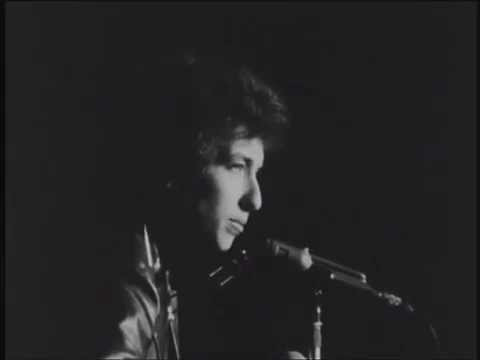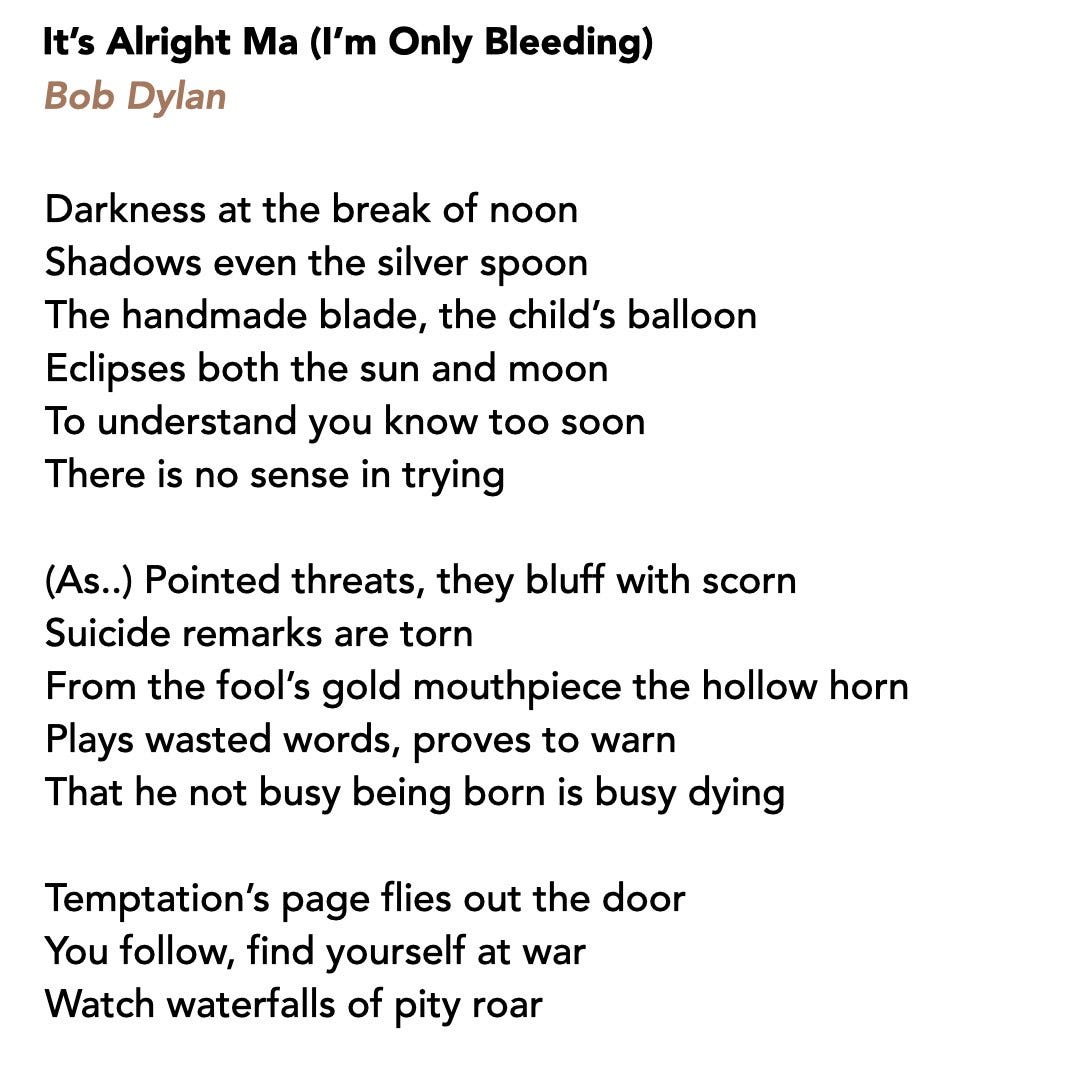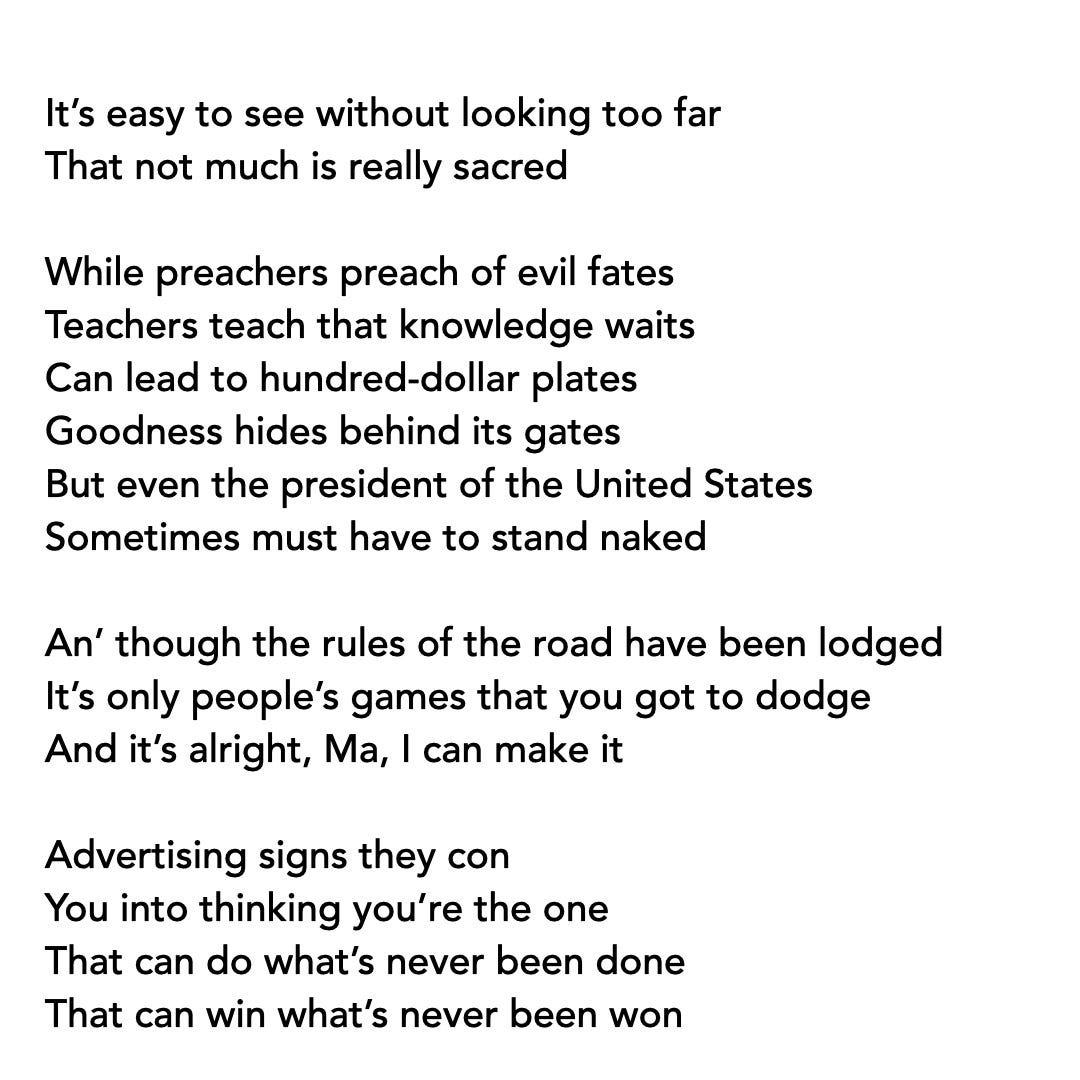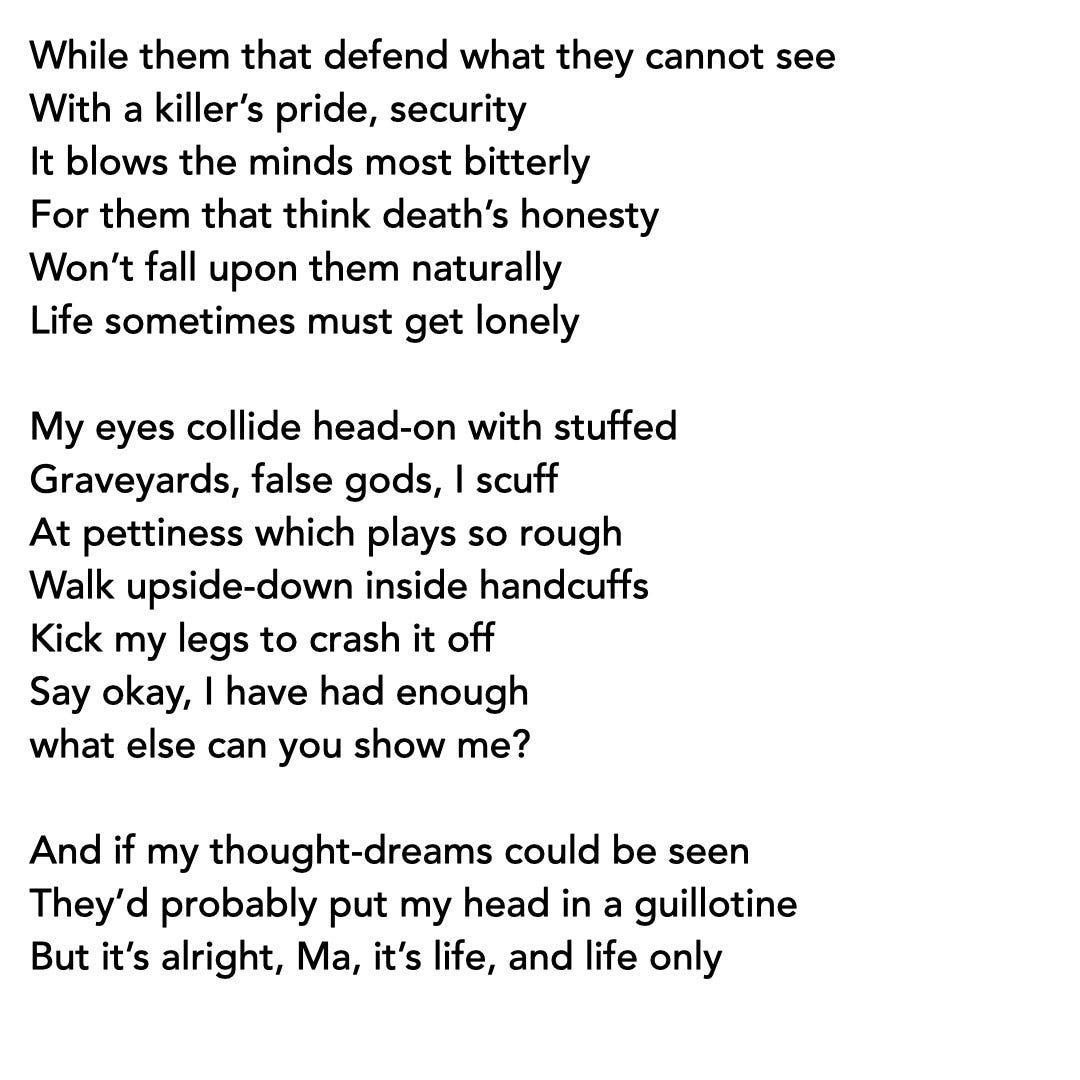i’ve sought, time and again, in this space, to reconcile the impossible distance between public events of catastrophic import, and a splintered self that is embodied in the continuous flux of locating itself within the chaotic contemporary. seen through the lens of creative activity, this tension is birthed in the work of art, as either an impasse between the ‘real’ and the ‘imagined’, or a plane of feeling that holds the possibilities of freedom from both. i am inclined, as a reader of artwork, towards the latter. if there is no light at the end of the tunnel, what’s the point of searching in the dark?
i detest “critiques” - not the critical discernment, and tightening of attention that comes with a sharpening of gaze; but the condescension that accompanies the callous, dismissive attitude towards that which doesn’t ‘merit’ such a gaze. why speak about that which shrinks the imagination? perhaps i am pointing towards a politics of optimism, over despair, hope over cynicism?
i return to that old question, then - how to live ethically in a world gone mad? how do these fingers hold the tremor of apocalyptic startle? how to speak of value in a world where democracy is a cocked gun in the hands of capital, where pagers and mobile phones explode in the hands of innocent people, and hospitals and schools are targets of extermination? how to conceive of an evolution of information technology that has become an accomplice in the violent ripples of jingoistic assertion? how to live fearlessly, to survive, knowing that some random megalomaniac who has no need for empathy, holds the trigger to invisible, intelligent systems of surveillance and attack, that can erase all traces of our fragile existence from this world?
how can we continue to function, how do we wake up and work, trust and believe, when events seemingly far from us wax and wane on our phones, like angry moons, reminding us, at every moment that somewhere, someone, is stifling a voice? is there a way of thinking about the world that doesn’t shred this mortal shell into smithereens?
we turn to stories of hope to remind ourselves, not that the world will right itself again, but that, despite it all… life goes on. often when i open the pages of my phone-news, i seek out stories of people being brought to justice, of laws amended, and people rising above their circumstances. we latch on to people ‘speaking truth to power’, but as foucault reminds us, the machinations of power hold the possibilities of dissent and resistance within them.
the more potent revolution is perhaps that of the imagination that has sensed the worst that the world is capable of, and is able to say… ‘it’alright…it’s life…and life, only’. this last aphorism is from a Bob Dylan song that i heard today, after a long time. perhaps i hadn’t properly paid attention to the words before. or perhaps my mind hadn’t felt the lacerations of the world in the way that it feels it now. whatever the reason, i felt dylan’s voice deep in my zehen, echoing some tacit truths, that i had not dared articulate before - even to myself. i reached the song today after catching an old interview of his, where he talks about the ‘magic’ of poetry. “Those early songs were…magically written..” he says, before quoting the first image of the song:
Darkness at the break of noon
Shadows even the silver spoon
The handmade blade, the child’s balloon
Eclipses both the sun and moon
To understand you know too soon
There is no sense in trying
as he intones the familiar angry rhymes in that whisky swill of a nasal baritone that settles noiselessly at the bottom of the damp barrel of the soul, his eyes glaze over in quiet contemplation. “Try to sit down and write something like that…”, he murmurs. “There’s a magic to that…a penetrating magic….I did it at one time….I did it once…I can do other things now, but I can’t do that”.
before we proceed, i’d like you to listen to the song afresh:
commentators have spoken about how this song holds a special place for Dylan, and have pointed out how it contains some of the most compelling images that have permeated American popular culture in a variety of forms. they’ve seen this as a song of ‘transition’.
when Dylan speaks about the loss of that magic - of not being able to write magic the way he wrote it then, as a younger person, I believe he’s referring to something that goes beyond skill, or insight. he’s speaking about a complex fearlessness that found freedom, not in the optimism of political emancipation, but in the very cynicism that managed to pierce through the hypocrisy of the world unfolding before him. the song embodies, not the positive energy of political solutions, but the quite, assured wisdom that comes with spiritual vantage.
And if my thought-dreams could be seen
They’d probably put my head in a guillotine
But it’s alright, Ma, it’s life, and life only
life, for that young Dylan, didn’t need an answer. the world he dreamed of, lay suspended between the everyday and the ordinary - an earth-shattering ordinary. there is no immortality, no utopia - even those who are sufferi
social movements, mobilisation, organisation and agitation - critiques of the establishment - they make you feel special, make you feel like you mean something. but isn’t this a pattern of interpellation that is most efficiently employed by advertising?
Advertising signs they con
You into thinking you’re the one
That can do what’s never been done
That can win what’s never been won
Meantime life outside goes on
All around you
(the emphasis added in the last two lines is mine)
as i listened to It’s Alright Ma on loop i felt a strange calm brought on by the juxtaposition of the world numbing event and the routine-haphazard-everyday-self. this is not a politics that bases its truth in revolution, in overthrowing the powers that be, and seeking justice. rather, there is a slow building up of momentum - mirrored in the repetitive riffs and the AAAAAB CCCCCD EEEEEF rhyme scheme - a gradual, acquired strength, a firm, undulating sense of perspective - mettle, call it what you want - that rejects erasure merely by the cognisance of it.
it is a profound maturity that can argue:
You lose yourself, you reappear
You suddenly find you got nothing to fear
Alone you stand with nobody near
When a trembling distant voice, unclear
Startles your sleeping ears to hear
That somebody thinks they really found youA question in your nerves is lit
Yet you know there is no answer fit
To satisfy, insure you not to quit
To keep it in your mind and not forget
That it is not he or she or them or it
That you belong to
Although the masters make the rules
For the wise men and the fools
I got nothing, Ma, to live up to
I urge you to read the words in their entirety….
postscript: i do not believe i have reached this place of calmness. i oscillate between anxiety - at life-transforming events (even if they are ‘distant’), and the transient thrill of a naive commitment towards a ‘better world’.
i cannot say, “it’s alright”. Yet. i incline, rather, to a kind of angry embrace with the future. i am still at that old favourite bombay aphorism - jo hoga dekha jaega. i wait for the day, when i don’t have to prove anything; when i can say ‘i got nothing to live up to’ to the wise men and the fools.
hope you, and your loved, are finding meaning in this tumultous time. do write to poetly@pm.me if you have any questions, queries, or comments. i will write back as soon as I find the space, and the time.
If you like what you read, do consider ‘buying me a coffee’.










"as he intones the familiar angry rhymes in that whisky swill of a nasal baritone that settles noiselessly at the bottom of the damp barrel of the soul, his eyes glaze over in quiet contemplation." Holy cow! I could spend an entire afternoon, analyzing this one sentence. This is the reason I love reading @Aranya and Poetly.
I recall my grandfather, a Shakespeare scholar once define poetry to me as "that which cannot be translated." Yet as I've read Poetly, Daak Vaak and other Substackers such as Joshua Doležal my definition of poetry continues to expand. Of course analyzing poetry by looking at its components _can_ run the risk of losing the magic, yet the way my mind works is much like my tongue when it encounters something utterly amazing—there's the initial joy, then the temptation to identify the components—known and unknown, and then re-swirling it around in my mouth a second or third time. Orgasmic.
That is what these two lines did for me:
- intones the familiar angry rhymes - the word choice (not says, reads, speaks but intones)
- the whisky swill of a nasal baritone settles noiselessly at the bottom of the damp barrel of the soul, I don't think I can be myself for the next few days 🤯
- his eyes glaze over in quiet contemplation - the other bookend of "intoning angry rhymes"
Whoa! If you don't subscribe to Poetly yet, stop reading and get over there!